Eating with other families
Thinking about everyday feasts and reunions, surprising human connections, and the lives that happened before us.
However you found your way here, welcome! I’m Emily, and I write letters about how we seek and tell stories to make sense of a changing world and our place in it.
I meant to post this a while back, as it concerns events over Christmas—though it’s really more about the evergreen themes of life and love and family so where it sits in the chronology of the year doesn’t really matter. Because I write about W.C.’s family for the first time in it, I wanted, out of courtesy, to let them have a read before I shared it—to they don’t think I’m using their hospitality, their way of life, as writing fodder!—and it took a while before W.C.’s brother visited them again and was able to translate it for them in person.
I’m glad to say they didn’t feel the need to change a thing or to omit anything for privacy reasons (which I always try to be careful about), so here it is ❤️
Every day was oriented around the dining table, sumptuously draped with string beads and tiny red hearts. In the late morning, or whenever we woke up: a bread basket and pancakes with jars of homemade apple, quince, and plum jams for breakfast. Then lunch. Then tea or coffee with homemade cookies and Stollen, a German fruit bread. Someone would light the candles and get the fireplace going. Then dinner, and a nightcap. I felt thoroughly spoiled. That’s what you get when you go home to the parents for the holidays—W.C.’s this time, not mine. Many of us who are ethnically Chinese like to say how, for our emotionally constipated parents, the language of love is food, because it’s the easier way to say I love you. But really, we all know no culture has a monopoly on that.
The first time I met W.C.’s dad, he was in an apron, coming out to greet us at the door. Let’s call him Gospodin A., because I love that Bulgarian word (господин) for Mr., or Sir? He partakes equally in the cooking and baking with his Gospozha, the two of them busying side by side in the kitchen to make us Knödel with jackfruit drumsticks, buhtichki, red veggie curry rice, corn and zucchini fritters, scrambled tofu with mushrooms and peppers, nut roast with Brussel sprouts and potatoes, mushroom and bean soup—the recipes all neatly penned on lined note cards. I’m probably conflating what we were fed on our most recent visit and our previous visit, but there wasn’t a single dish I didn’t like. Visiting other people’s homes, it can sometimes be a minor source of anxiety for me when I feel unable to finish the food they offer me, either because I am genuinely too full or I don’t love the food—we all have our preferences, hey?—since I grew up with my mum grilling it into me that a good guest eats everything their host serves them. But at W.C.’s family home, I needn’t have worried. I licked every plate clean.
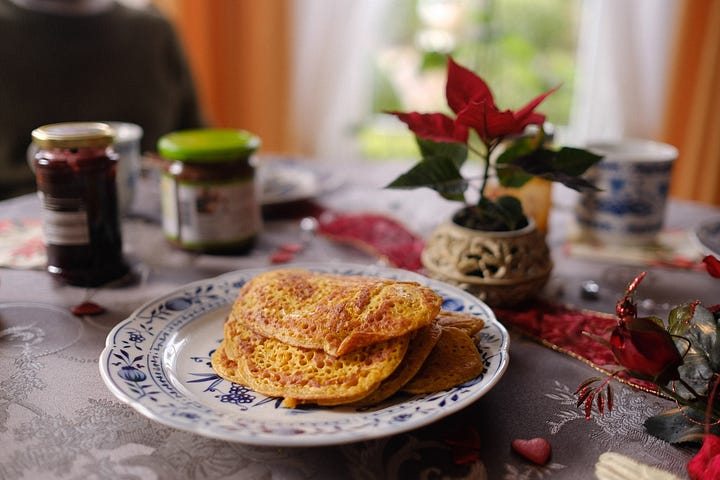
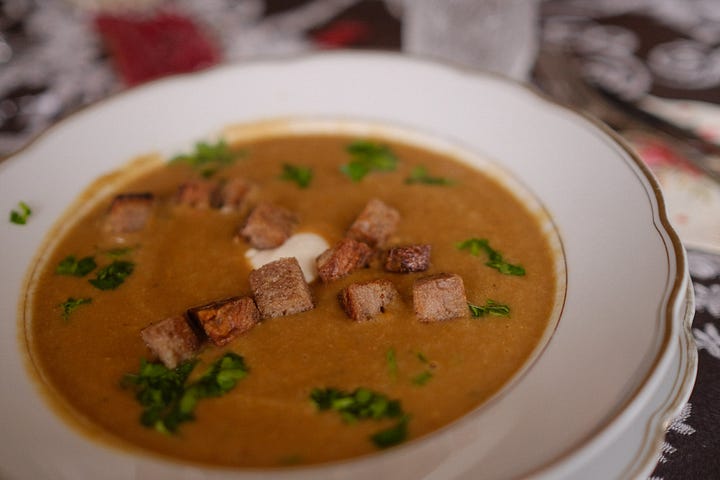


Later, after we had spent some time huddled on the sofa before the television, or played Scrabble and Take It Easy, Gospodin A. would materialize—with a glass of homemade mulled wine, or a baked quince with figs topped with caramelized almond flakes. Every night on this last trip, when the rest of the family was watching a movie or a German comedy classic, my head invariably found W.C.’s shoulder, my mouth hanging ajar—Gospodin A. has the photos to prove it. I was still recovering from jetlag; the days were growing dark at 3 p.m. My series of flights from Kuala Lumpur to Berlin had been disrupted by a flight delay, which got me stuck with a crowd of World Cup fans in Doha the day after Argentina’s triumphant game, and then later, a cancellation that necessitated an overnight stay in Frankfurt. All in all, it had taken me forty hours to arrive.
After pandemic lockdowns and food price inflations exacerbated by the war in Ukraine, it feels like there has been a greater move among many people to make more of their own food—and, for some, to go further in growing their own produce, to prepare dishes from scratch. But W.C.’s parents seem to have been doing it for a long time. Their home is on the outskirts of Leipzig, and when we were last here in autumn, they took me on a little tour of their garden where besides vegetables like pumpkin, kale, and rhubarb, they also grow grapes, plums, quince, fig, and strawberries, which they use to make assorted jams, storing them in jars and topping them with a layer of alcohol so they can last three years. I understand nothing of the alchemy of such things, but the jams—the undiluted fruit pulp! the texture nothing like the too-sweet silky-smooth jelly you can slice clean!—were delicious. Gospozha A. often sends boxes of such homemade goodness to W.C. in Berlin through the post, and though he can guzzle up a jar of jam in two days, he still has about nine jars in his pantry waiting to be consumed.
At breakfast one morning, W.C. and his brother both eyed a jar of apple-and-quince jam. His brother declared that he was going to smuggle it back with him to Erfurt, W.C. threatened to divert it to Berlin—and through all this, Gospozha A. giggled, her face glowing in the wan winter’s morning light.
Between all this eating, we would sometimes head out to take a walk around the town they live in, or take the train to Leipzig to stroll around the Christmas market or sit in a cafe. Mostly though, we just sat at home around the living room watching movies and playing games, taking knitting lessons from Gospozha A.—I’m as bad as I ever thought I would be at it, tying up my own fingers with the yarn!—and getting the kitchen messy while testing out her cookie recipe for ourselves. There was also some merry-making with the two brothers—one on the piano and the other on the accordion—as Gospozha A., locked in an embrace with her Gospodin, sang to commemorate Christmas Eve before we opened our presents. It always warms me to see how demonstrably affectionate they are with each other; my parents can be, though less frequently, and not without sly self-aware smiles. (Once my aunt and I caught them holding hands on a family holiday together, and we pretended not to notice, tried not to laugh!) Like his parents, W.C. is comfortable showing his affection, though I admit to fending off his P.D.A when we’re on my home turf, to his laughing bewilderment. His brother and his girlfriend, too, are in their mid-twenties, but act for all the world like teenagers in love! ❤️
At their house, I struggled a little with being the only person who couldn’t speak German (I did start learning it but then took too long a hiatus—I’m now back on intensive classes), though W.C. did an admirably efficient job at translating to me what was being said. I arrived late to every wisecrack or pun but managed to ask his parents a few questions through him and learned that they had met at a Studentensommer—a kind of cultural exchange program for young people—in Budapest in 1982, at a time when the Soviet Union still existed. There, they lived in dorms together and divided their time between work, socializing at discos in the evening and traveling by bus on weekends to see the country. I remember W.C. telling me, when we had to do a year’s long-distance during the pandemic, that his parents had had to do the same, as it was only two years after they had met that Gospodin A. was able to move to Germany. “And they did it without video calls,” W.C. had said.
I was curious about this congregation of youths in Budapest, in a way that, W.C., having grown up amid Germany’s cleaving and subsequent reunification and made to learn about it over and over in school, perhaps felt he never had to ask too much about. Gospozha A., who is German, arrived in Hungary from Leipzig, where she was living with her family at the time. Gospodin A. came from Bulgaria. At the time, Gospozha A. said, she could only travel to other countries within the Soviet Bloc, but the Studentensommer apparently admitted people from non-socialist states too—“It was one of the few ways to be exposed to the world at the time.” She remembers meeting people from the Nordic countries there, but could not remember if any Americans were in attendance.
I wish I could have learned more, but I’ll have to save my curiosity for another time when my German is up to the task. All I remember of the Cold War these days is what I studied in my elective History modules at university, which was a long time ago. But I’ve often wondered: might some aspects of how W.C. and his family live be attributable to having lived in East Germany, where life was more often marked by a certain leanness, not abundance?
I don’t want to read too much into anything, but they seem more self-sufficient, more disciplined, than many people I know. They also seem to be able to concur on new ideas any one of them brings home, whereas I couldn’t imagine my family ever being so agreeable—everyone would think they know better, that someone read this here and someone read that there so who is to say who is right? It’s probably that W.C.’s family just communicates better or are already mostly on the same page with things, but it did make me wonder how much of it could have been shaped by the wider political and social structures governing them. I’m thinking about my trip to Belfast some years back: while talking to someone about the Troubles for a story, a conflict mediator told me that Protestant loyalist organizations such as the UVF tended to be more autonomous, and top-down orders from their central command weren’t always followed—unlike Catholic republican organizations such as the IRA, which tended to fall in line more. One of the reasons for this, he said, was how their religions were organized: “I mean, Protestantism, by its nature, schisms into lots of different churches. Catholic communities are inherently centralized communities, with one church. You see that reflected in the differences in how the two communities do things.” Was there perhaps something of the sort—though non-religious—at play here?
Another thing W.C.’s family seems less prone to: the excesses of consumption. They still shop at the supermarket, of course, but they also grow their own produce and make their own jams. The Gospozha knits her own sweaters. The Gospodin brews his own alcohol in the basement cellar. There’s less of an urge to simply replace things whenever something gets old or worn. W.C. is also always looking to mend his clothes and bags and things (well, when he finally stops procrastinating and brings them to the tailor’s or cobbler’s) and to forage from preloved piles people have simply left out on their doorsteps—quite the thing in Berlin—which has so far given us a printer, a wooden lounge chair, and a hand mixer. Not too shabby!
It has been interesting to appreciate, up close, the ways in which families are different, but also the ways in which they are the same. And it still surprises me how all of this has flowed from my very chance meeting with W.C. in a Berlin cafe three and a half years ago. I’d needed a cafe with strong WiFi that stayed open late where I could use my laptop (I was bumping between hostels then and didn’t have a dedicated desk); W.C. had made a habit of frequenting the same cafe to sketch on paper, before heading back to the dark of his studio to conjure up video-game worlds. A close friendship struck immediately; the rest took some time. When it did, it all seemed to have happened perfectly naturally: one thing led to another, and then another, and then another. I don’t think either of us intended to make anything happen. We were living on different continents. It was hard to know or say out loud what you wanted, what to even attempt, when you didn’t know yet what was actually there.
“How did you first notice each other?” I asked Gospodin A. one afternoon as we convened for kaffee und kuchen—which I’ve come to realize is something of a German ritual, not just something W.C. is partial to.
“First, I saw a pair of yellow shoes…” Gospodin A. started. “Then, my gaze drifted upward and I saw a nice figure, okay, and curly hair… I loved curly hair on a girl,” he said, swilling a glass of the Bornean tuak I had brought him from Malaysia (which he called “juice”! 😆) with faux indolence.
Smiling, I waited for the dig. Gospodin A. likes to tease his Gospozha, and I love how she would burst into chortles before catching herself to huff at him, crossing her arms in faux annoyance.
“Later, I realized it was fake...”
His Gospodzha rocked back, laughed with her whole body. “I’d had it permed!”
Read in place
I had bought this from a bookstore in Berlin for its enigmatic opening passage, which transported me completely:
She rides out of the forest alone. Seventeen years old, in the cold March drizzle, Marie who comes from France.
It is 1158 and the world bears the weariness of late Lent. Soon it will be Easter, which arrives early this year. In the fields, the seeds uncurl in the dark cold soil, ready to punch into the freer air. She sees for the first time the abbey, pale and aloof on a rise in this damp valley, the clouds drawn up from the ocean and wrung against the hills in constant rainfall. Most of the year this place is emerald and sapphire, bursting under dampness, thick with sheep and chaffinches and newts, delicate mushrooms poking from the rich soil, but now in late winter, all is gray and full of shadows.
Her old warhorse glumly plods along and a merlin shivers in its wicker mew on the box mounted behind her.
The wind hushes. The trees cease stirring.
Marie feels that the whole countryside is watching her move through it.
She is tall, a giantess of a maiden, and her elbows and knees stick out, ungainly; the fine rain gathers until it runs in rivulets down her sealskin cloak and darkens her green head clothes to black. Her stark Angevin face holds no beauty, only canniness and passion yet unchecked. It is wet with rain, not tears. She has yet to cry for having been thrown to the dogs.
While W.C. and I began reading the book out loud to each other (yes, we sometimes do that 😆—try it!) his brother started to improvise a tune on the piano. And it felt like the perfect soundtrack.
For the readers among you: If you’re looking for something with a sweeping narrative arc, this book may not quite be the thing. But I get different things out of different books, and loved this for its detailed historical world-building.
Postcards from Leipzig
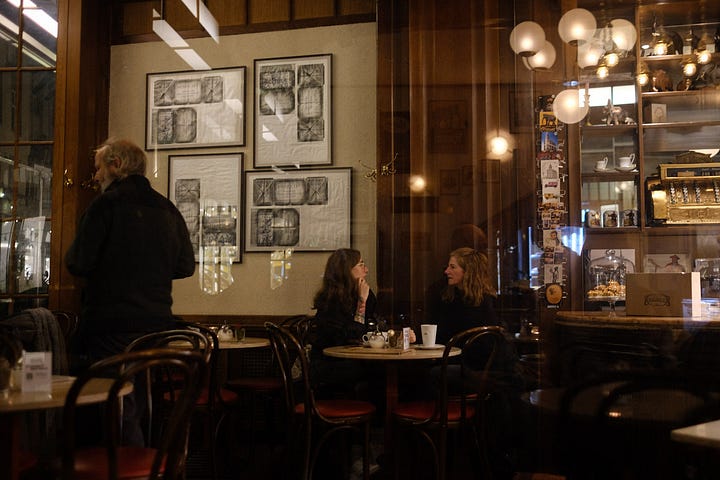

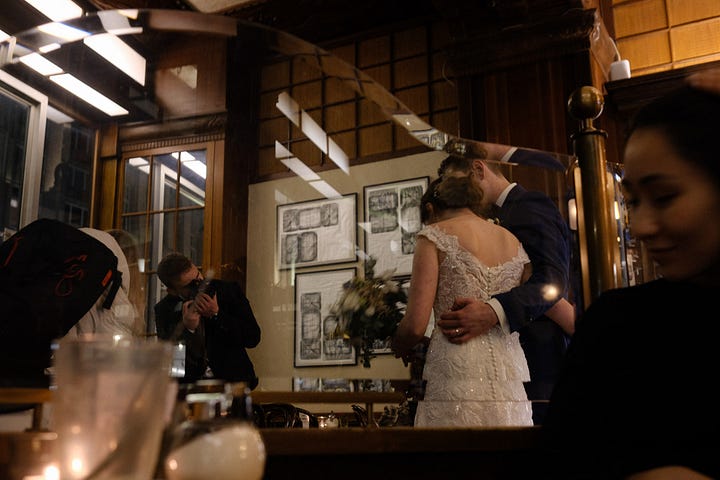
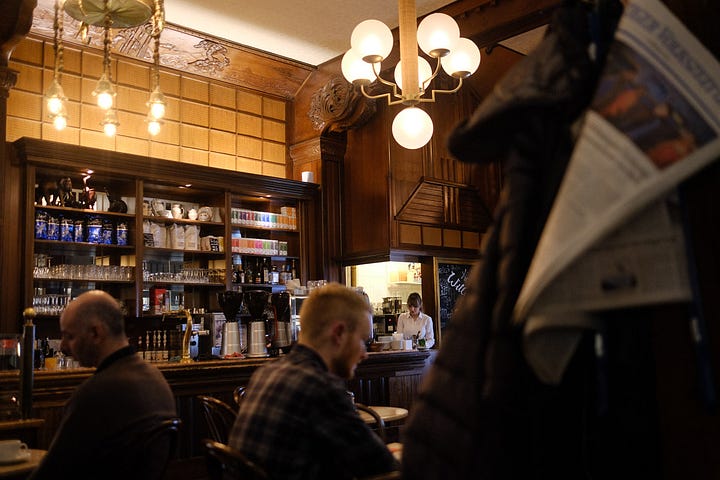
Until the next,
E.




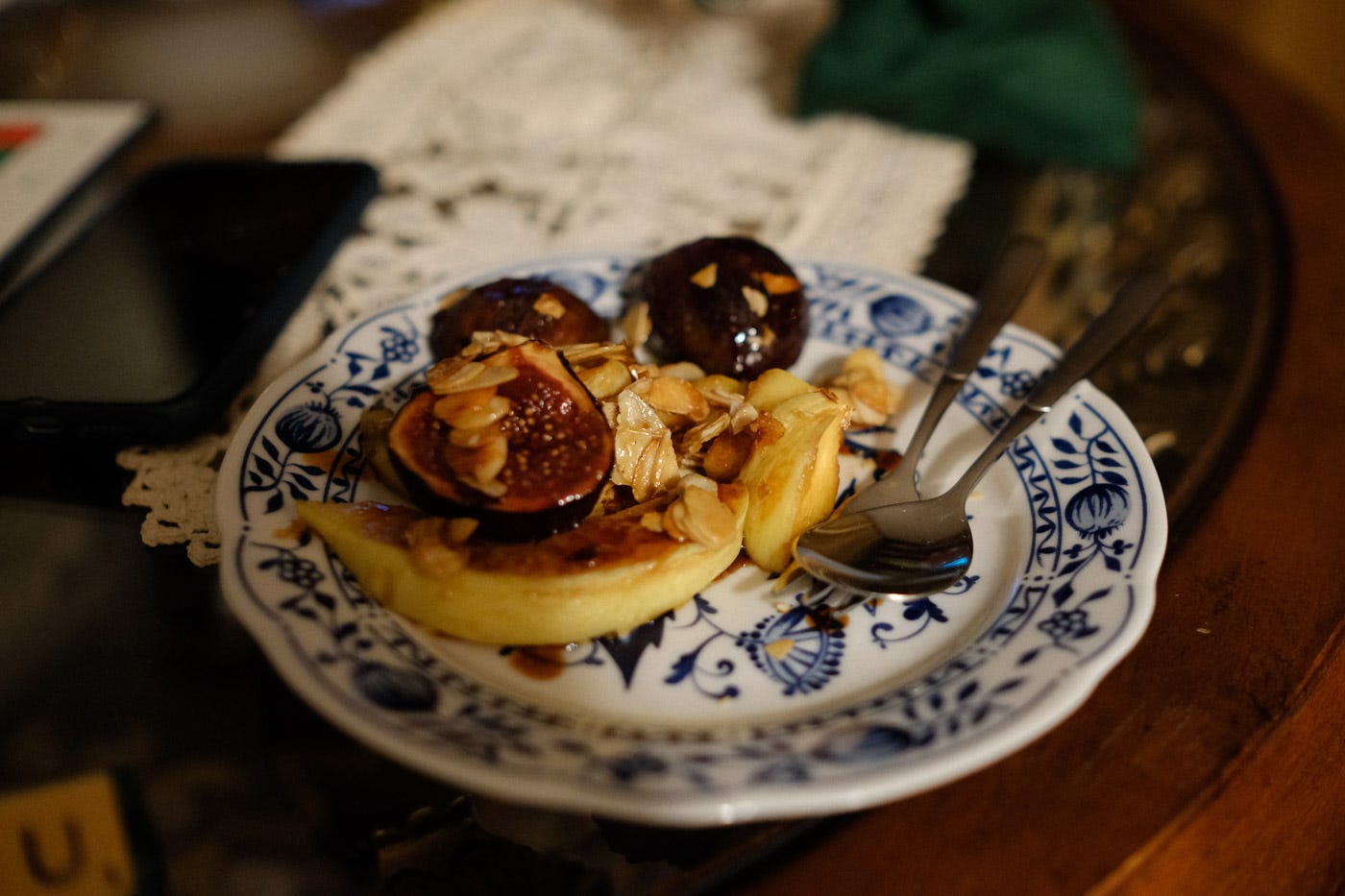
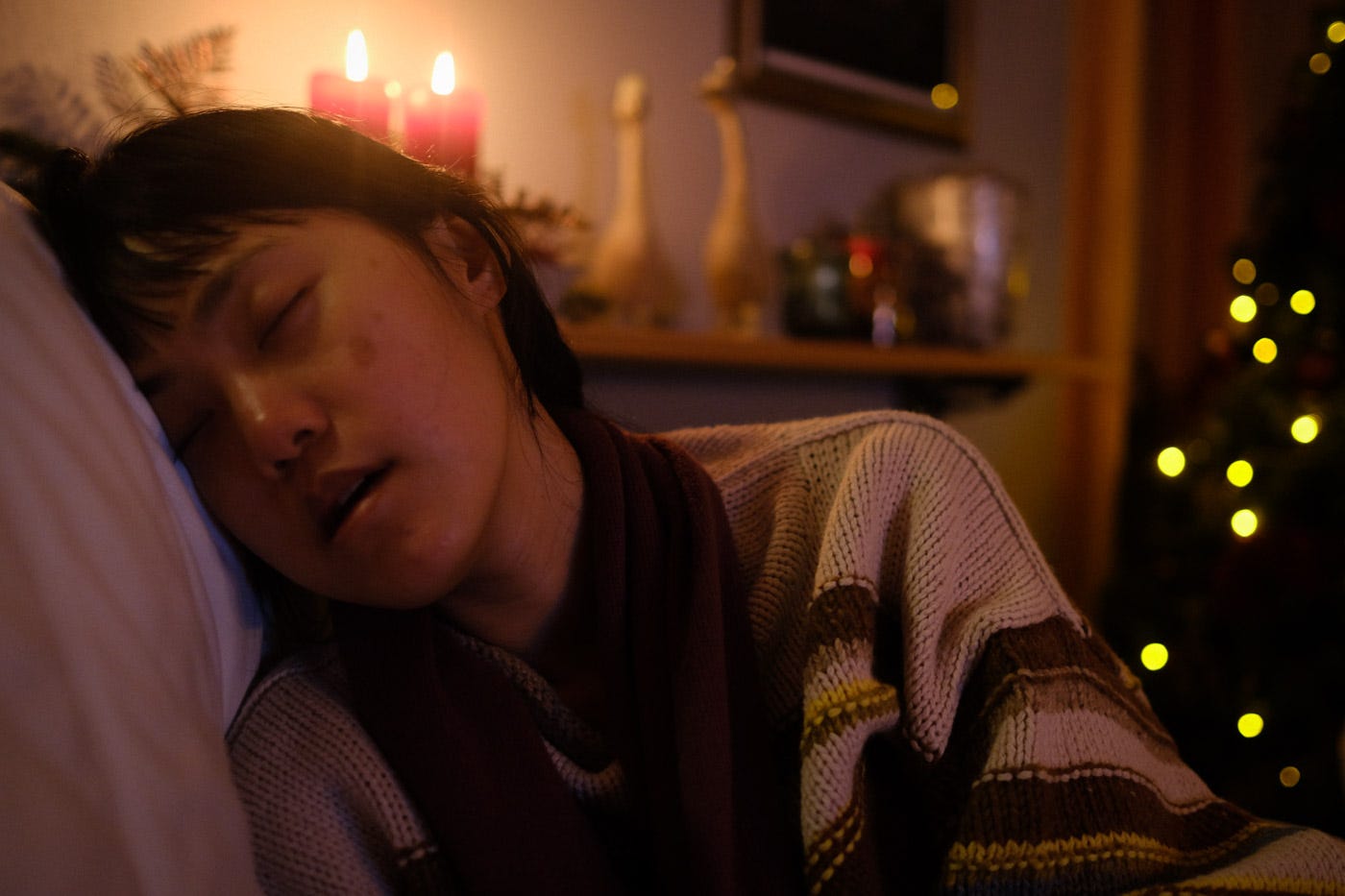
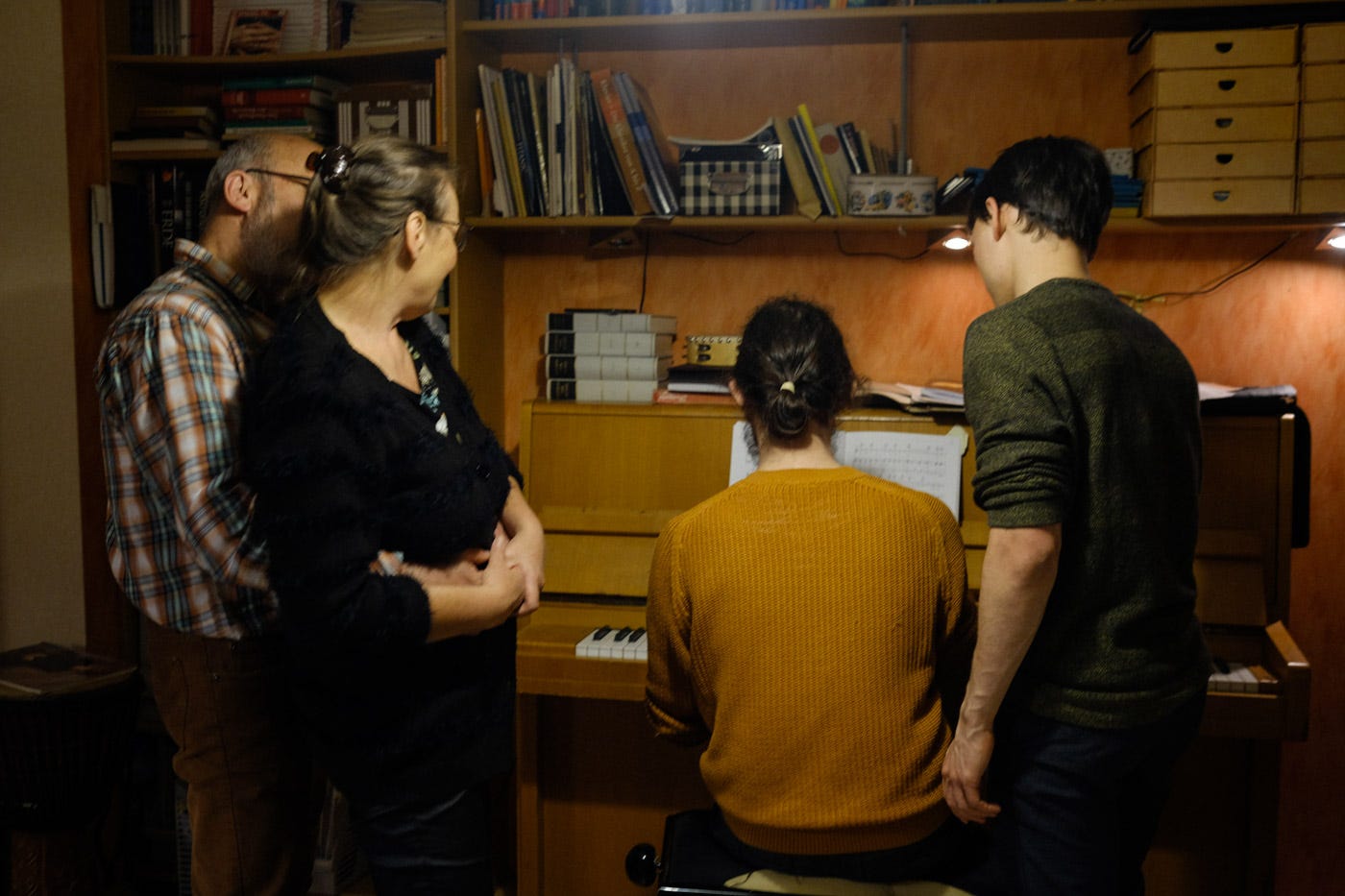

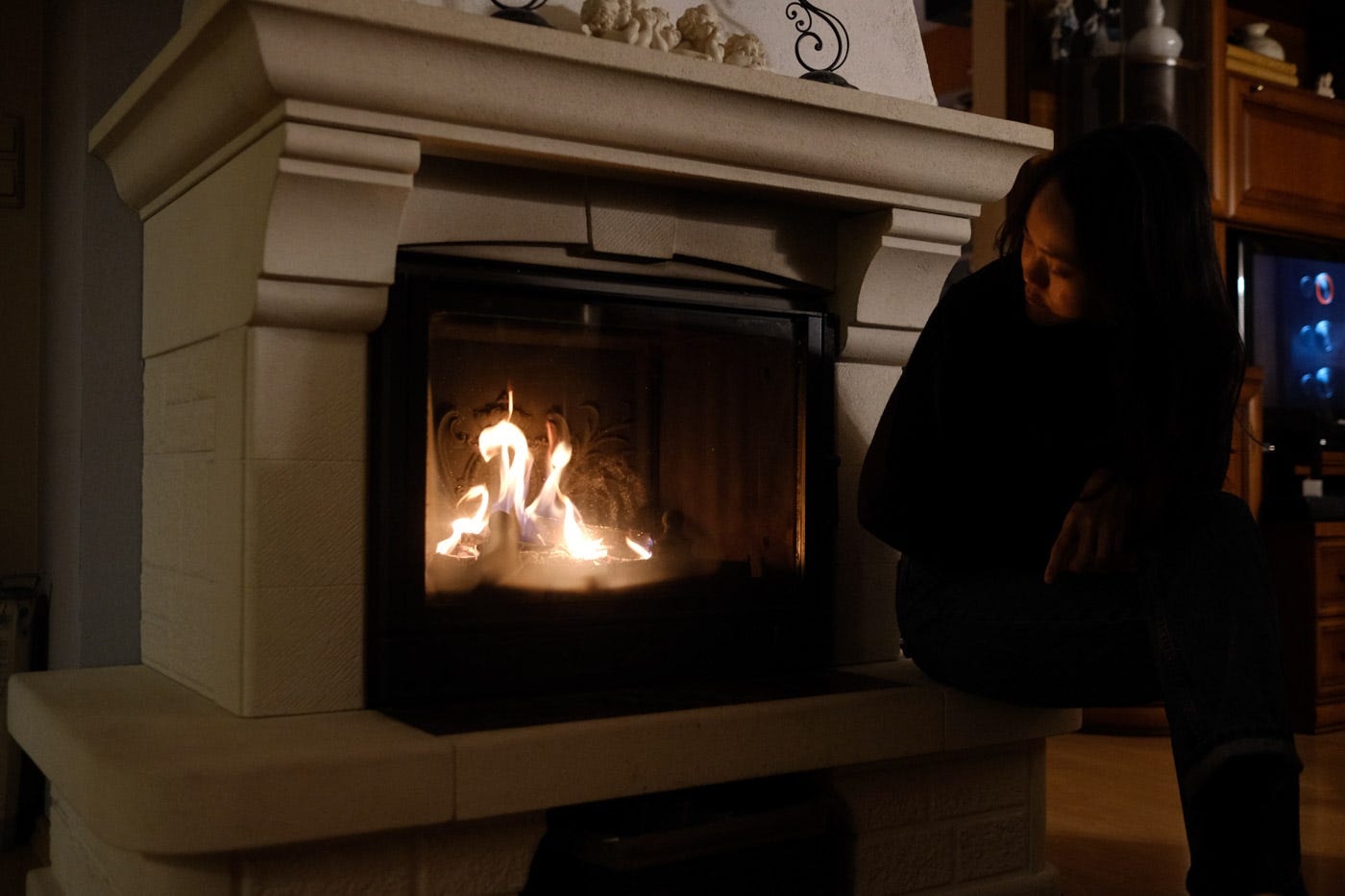
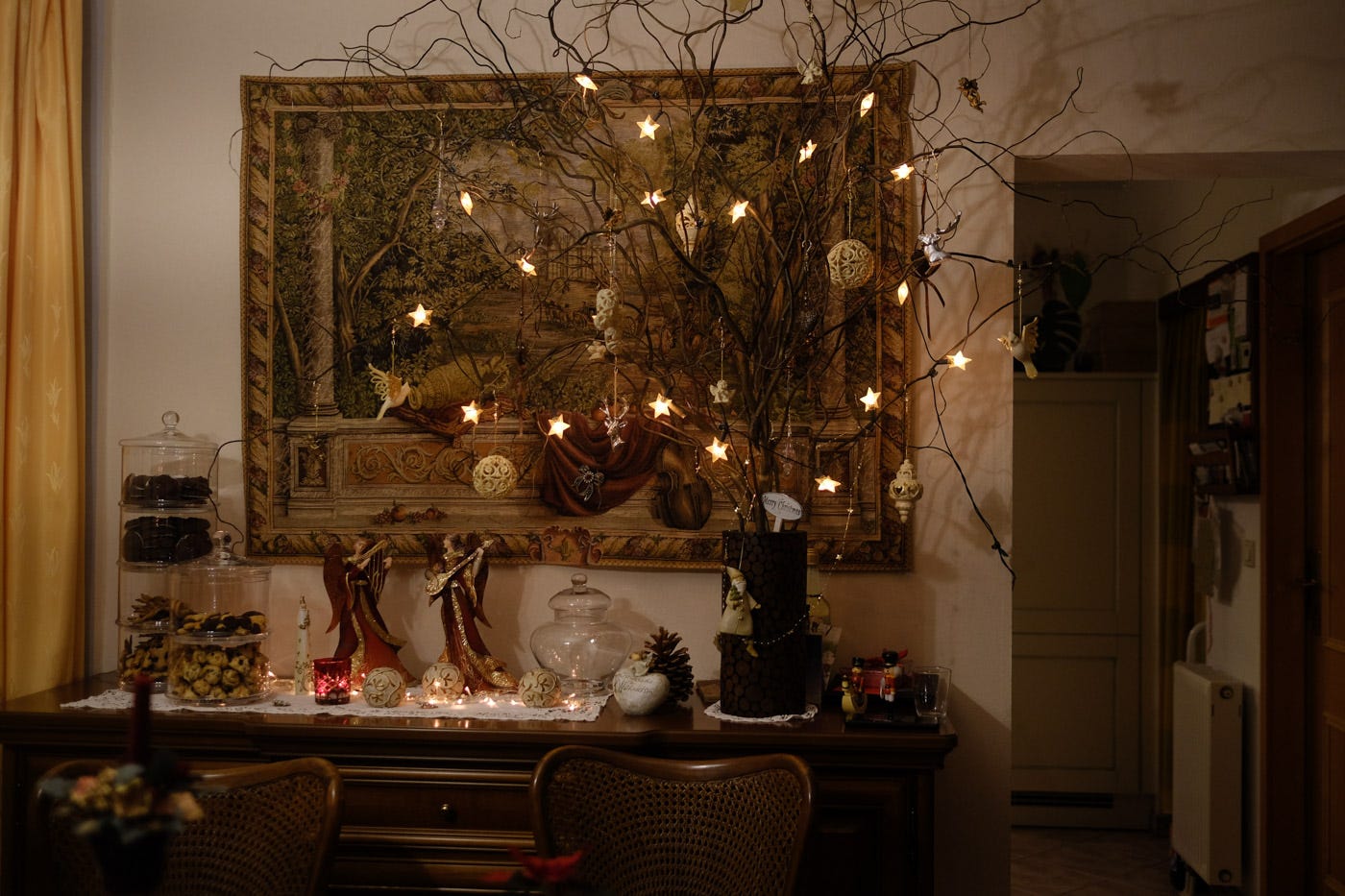
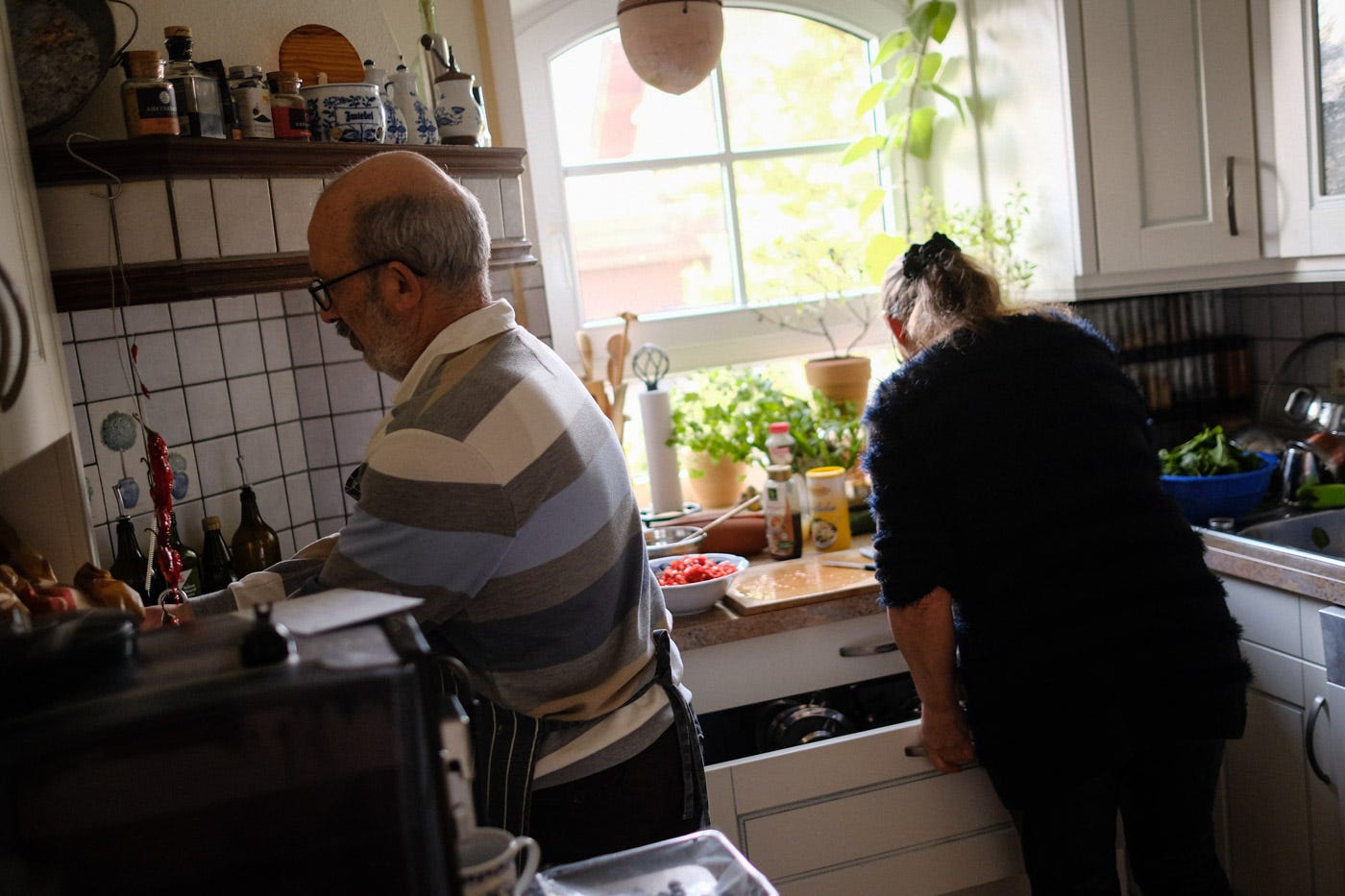

love love this intimate detailed narrative and your discovery of it all and also the love story ive been able to witness first hand :D and wow brother is incredibly talented, as im sure D is also!